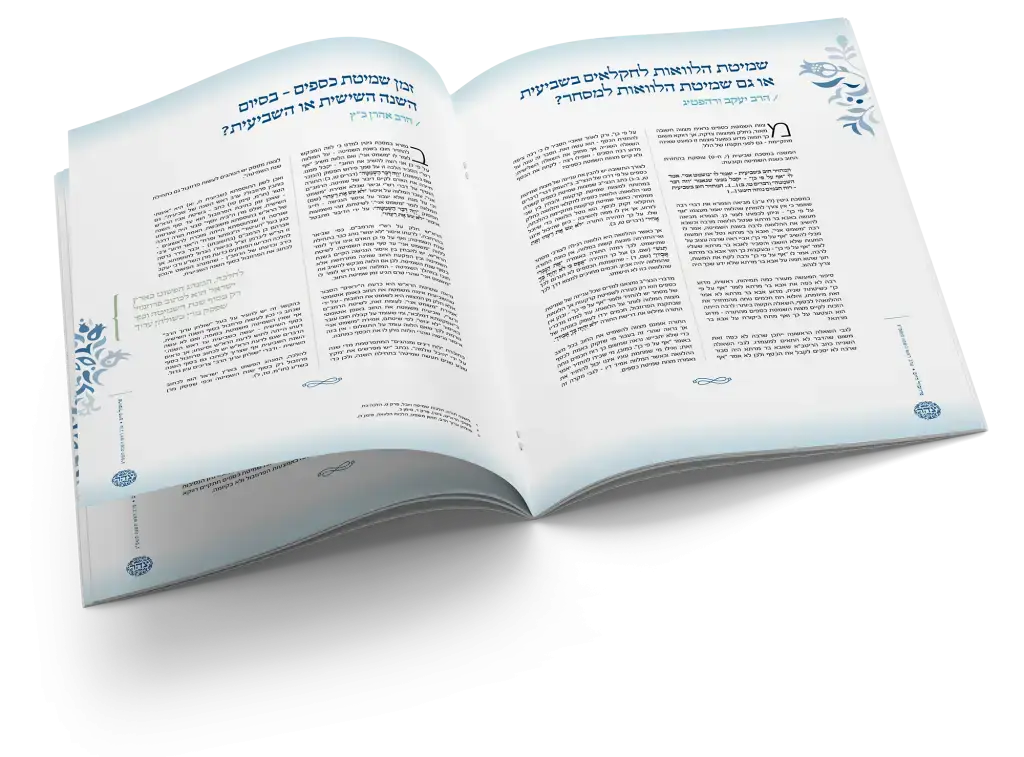
חותמים
למען חברה צודקת
What is a Pruzbul?
At the completion of the Shmita year, every Jew has a positive commandment to “forgive” any debts that they are owed by others and to drop any claims that he or she might have to reclaim those monies.
According to most opinions, this mitzvah remains in effect today, as a rabbinic (d’rabanan) commandment.
In order to address the obvious issues that could result from this commandment and witnessing how Jews were avoiding issuing loans to others, the sage Hillel the Elder instituted the “Pruzbul,” a document which, upon signing, meant that the terms of the loan remained in effect even after the shmita year and the funds would still need to be repaid.
Via this Pruzbul, the debts were transferred out of the hands of the individual but into the authority of a Beit Din. While the Torah prohibits the ability of private individuals to recover debts, that same prohibition does not apply to the Beit Din.
By registering below, you are assigning Tzohar as your shaliach (agent) to sign onto the Pruzbal. Everyone who registers on the website will have a shaliach represent them on Erev Rosh Hashana on the Pruzbul in the official halachic manner in the presence of two witnesses which will then be presented to the Beit Din as required by halacha.
*This allows you to ensure that any debts owed to you remain in effect because halacha allows for the assigning of a shaliach for this purpose without the need for each and every individual to sign the document.
Halachot of Pruzbul
Complied by Rabbi Avraham Stav
In Parshat Re’eh it’s written that “ מִקֵּץ שֶׁבַע שָׁנִים תַּעֲשֶׂה שְׁמִטָּה. וְזֶה דְּבַר הַשְּׁמִטָּה שָׁמוֹט כָּל בַּעַל מַשֵּׁה יָדוֹ אֲשֶׁר יַשֶּׁה בְּרֵעֵהוּ לֹא יִגֹּשׂ אֶת רֵעֵהוּ וְאֶת אָחִיו כִּי קָרָא שְׁמִטָּה לַה' . At the end of seven years you shall perform Shmita. This shall be the nature of the Shmita: all creditors shall remit the due that they claim from their fellow [Israelites]; they shall not dun their fellow [Israelites] or kin, for the remission proclaimed is of Hashem.” (Dvarim 15: 1,2)) It is thus a mitzva from the Torah for every individual to absolve others of debts owed to them from loans that have not yet reached their maturity date and by the end of the year they must be remitted. In modern times, when the Yovel is no longer performed, the concept of remitting monies is only a rabbinical commandment (Shulchan Aruch, Choshen Mishpat, 67:1)
Hillel the Elder observed that as a result of this commandment people would refrain from giving out loans, particularly as we grew closer to the shmitta year and therefore proposed the Pruzbul document which ensured that the debts would not be absolved (Gittin 36:1). The essence of the Pruzbul is to transfer the debts from the private domain into that of the Beit Din whereby the court is not subject to the mitzvah of Shmita (as only individual debts are remitted, but not those of the Beit Din.)
The poskim have debated the question of whether this issue of shmita relates to bank deposits and loans (Yabia Omer, 10, Choshen Mishpat, 3:17) It is therefore prudent that today every individual as well as the banks, draft the Pruzbul.
The poskim also debate over which “Beit Din” should be transferred the debts: According to the Shulchan Aruch it must be a “respected Beit Din” where there are at least three experts in the relevant laws whereas the Rama says it just needs to be three men.
According to most poskim, there is no requirement for an individual to personally draft the pruzbul but it is enough that two witnesses be present who can testify that the debts have been transferred. However, there are those who don’t hold that position.
In practice, there are those who will present in front of three men and assign them as a “Beit Din” and there are those who will present in front of two men and assign them as witnesses who will then present before a “respectable Beit Din.” The Tzohar form is designed based on the latter practice, in accordance with both the Shulchan Aruch and the Rama.
The Pruzbul is effective for only those debts whose maturity preceeded the drafting of the Pruzbul. It is therefore customary to wait until as close to Rosh Hashana as possible to draft the Pruzbul.
According to the vast majority of poskim, one may assign a shaliach (agent) to draft the Pruzbul (Yabia Omer, 2, Chosen Mishpat, Siman 5). The text used in our document is based on assigning an agent whereby an agent can be assigned at a time prior, and the messenger will draft the Pruzbul on Erev Rosh Hashana and it will affect even those debts accrued after the messenger was assigned (and before Erev Rosh Hashana.)
The shaliach cannot assign a different shaliach for this purpose and therefore each person needs to complete the form for their individual needs.
There are those who have the custom, after the Pruzbul has been drafted, to loan a symbolic sum of money to be completely in fulfillment of the mitzvah of Shmita. This means that after assigning the shaliach for the Pruzbul, it would be appropriate to “loan” a sum with the knowledge that that debt will not be returned but that it will come mature before the end of the year. These funds should be “loaned” (under these specific terms) to someone who will then distribute the funds to the needy.
FAQs
At the end of the seventh year, the Shmita year, every person has a mitzva ‘lishmot”–to remit monies owed to them and to drop any claim to those monies.
In Parshat Re’eh it is written: “At the end of seven years we perform Shmita. This shall be the nature of the Shmita: all creditors shall remit the due that they claim from their fellow [Israelites]; they shall not dun their fellow [Israelites] or kin, for the remission proclaimed is of Hashem.” (Dvarim 15: 1,2). The Rambam writes that this is a positive (aseh) mitzvah as in we are “commanded to remit monies, as in all debts when the shmita year comes,” as well as a passive (lo taaseh) commandment “where we are not allowed to claim those monies but they must all be remitted (Sefer Hamitzvot). Both the Rishonim and Achronim discuss this issue at length whether the Torah is freezing the debts or whether it is more an issue that the individual has to forgive the debts owed to him.
According to the Rambam, the essence of the Mitzvah is to be “compassionate” to the [plight of) the workers and the poor” and according to the Sefer Hachinuch the mitzva is intended to “teach us the importance of traits of charity and to place in our hearts full faith in Hashem.”
At the end of the seventh year, the Shmita year, every person has a mitzva ‘lishmot”–to remit monies owed to them and to drop any claim to those monies.
In Parshat Re’eh it is written: “At the end of seven years we perform Shmita. This shall be the nature of the Shmita: all creditors shall remit the due that they claim from their fellow [Israelites]; they shall not dun their fellow [Israelites] or kin, for the remission proclaimed is of Hashem.” (Dvarim 15: 1,2). The Rambam writes that this is a positive (aseh) mitzvah as in we are “commanded to remit monies, as in all debts when the shmita year comes,” as well as a passive (lo taaseh) commandment “where we are not allowed to claim those monies but they must all be remitted (Sefer Hamitzvot). Both the Rishonim and Achronim discuss this issue at length whether the Torah is freezing the debts or whether it is more an issue that the individual has to forgive the debts owed to him.
According to the Rambam, the essence of the Mitzvah is to be “compassionate” to the [plight of) the workers and the poor” and according to the Sefer Hachinuch the mitzva is intended to “teach us the importance of traits of charity and to place in our hearts full faith in Hashem.”
It is also worth noting that while some propose that the funds must be remitted already at the beginning of the year, the halacha according to the Shulchan Aruch and the Rambam is that it waits until the end of the year, immediately before the Rosh Hashana of the eighth year.
According to most opinions, the mitzvah today is “only” a rabbinic commandment and unlike the shmita of the land, shmita of funds also applies outside of Israel.
The gemarra in Gittin (36:1) write “at the time that you remit the lands- you also remit the funds- the time when you don’t use the land, you also don’t use the funds.” According to Rebbe, in modern times, when there is no Yovel, shmita of monies is no longer a biblical mitzva.
However there were Rishoniom who felt otherwise that it remains a Torah law, although there are also those who say the mitzvah doesn’t have any application anymore. In practice, the Shulchan Aruch and the Rama both hold that the mitzvah is a rabbinic commandment in our days. (Chosen Mishpat 67,1)
The gemarra in Kiddushin espouses that remittance of monies is also applicable outside of Israel as it is a “body-related debt” as opposed to a “land-related debt” and based on this chazal has taught that the mitzva also applies outside of Israel.
Only those debts where the maturity date is before the end of the shmita year. As such, there are differing opinions whether the laws of shmita apply to debts related to loans or also debts related to sales or compensation. The poskim also debate whether bank deposits are remitted. Because of any doubts it is important that every individual complete a Pruzbul and be free from any doubts or questions.
Hillel the Elder saw that the wealthy were avoiding giving out loans as Shmita approached out of fear they would not recover their debts and therefore drafted the Pruzbul which is designed to ensure that the debts would not be absolved.
The term “pruzbul” means transfer (in Greek.) The person who is owed debts transfers the rights over those debts to the Beit Din and as such they remain to be paid. This is made possible based on the understanding that only private individuals are able to remit debts but they are not remitted when they remain in the control of public agents- like a Beit Din.
According to the vast majority of poskim, it is permitted to assign a shaliach to write a Pruzbul on one’s behalf and these include Rabbi Ovadia Yosel and Rabbi Yosef Shalom Elyashiv. This process of assigning a messenger can be done by phone or the Internet, but that process needs to be done by the person who is owed the debts themselves and not a third party.
It is highly preferable that a person who is having the Pruzbul written for him knows about it and explicitly asked as such to the shaliach, but in certain circumstances it is allowed for a Pruzbul to be written without the expressed knowledge of the person, and most halachic authorities support such an action.
It is highly preferable that a person who is having the Pruzbul written for him knows about it and explicitly asked as such to the shaliach, but in certain circumstances it is allowed for a Pruzbul to be written without the expressed knowledge of the person, and most halachic authorities support such an action.
Even after an agent is assigned, any debts accrued before the Pruzbul is drafted, are considered transferred to the Beit Din and therefore one need not wait to assign the shaliach. Those who wish to be particularly stringent in this manner can wait till immediately before Rosh Hashana to assign the shaliach.
In order to address this issue, there is a commendable practice to loan out a symbolic amount of money even after the Pruzbul is written and in that way you have fulfilled the mitzva. It is most appropriate to make sure the loan is going to needy people so that you are both performing the mitzvah and acting with compassion to others.
When a person doesn’t properly participate in the Pruzbul, he is unable to make a claim on those debts. However, it is still the just practice of the person with the debts to repay them and it certainly acceptable to receive them but when receiving them it should be understood that it is as a gift and not a halachic requirement.
Almost every operating entity has debts owed to them, either from clients or the bank and it is therefore that a senior representative drafts aPruzbul or assigns a shaliach for this purpose. (We recommend that in these cases, the applicant uses a separate address on the form so they will receive a separate return confirmation.)
Shana Tova!



